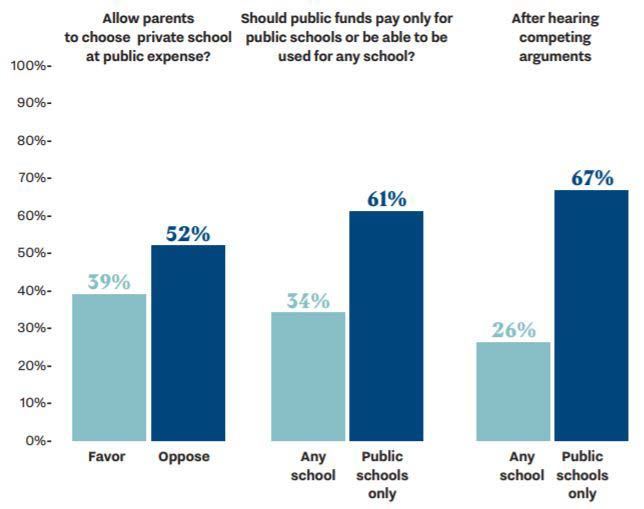Poll: Academic Achievement Less Valuable than Career Prep
- By Dian Schaffhauser
- 09/25/17

Academic achievement is highly over-rated — at least to many Americans. The U.S. public would like to see their education dollars to go into programs that support career preparation and soft skills while giving a thumbs-down to vouchers and standardized testing.
Those are the results from the latest PDK Poll of the Public’s Attitudes Toward the Public Schools, which surveyed randomly selected 1,588 adults by phone in English or Spanish earlier this year. The goal: to understand the broader trends of U.S. opinion on public education. The poll is financed by the PDK Educational Foundation, a non-profit set up by Phi Delta Kappa International; and the results are published in the organization's magazine, Kappan. The survey project has been going since 1969.
This year's study also included a pair of statewide samples, which focused on Georgia and New York, each of which received coverage in separate reports.
According to the results, more than eight in 10 respondents (82 percent) support job and career skills classes, even if students need to spend less time in academic classes. The same number believe it's important for schools to help students develop their interpersonal skills, such as cooperation, respect and persistence.

Interest in academics gets a lower rating; 76 percent of respondents said advanced academic classes were "highly important indicators of school quality." Just 42 percent stated the same about performance on standardized tests; only 13 percent pronounced test scores as "extremely important." In comparison, three times as many people (39 percent) ranked interpersonal skills that high, and 37 percent put technology and engineering instruction in that category.
The idea of using publicly funded vouchers to send students to private school isn't gaining favoritism. Most Americans said they were opposed to it (52 percent vs. 39 percent). When the issue was described in more detail to respondents, opposition rose — to 61 percent. When the question was refined specifically to refer to the use of vouchers for attending religious schools, which make up 69 percent of private schools in the country, disapproval shot up even higher — to 73 percent — among those who have no religious affiliation or profess a non-Christian religion.
The Georgia state survey exposed an even number of respondents supporting and opposing vouchers for private schools (48 percent in favor and 47 percent opposed). New Yorkers, on the other hand, were more likely oppose public funding of private schooling (51 percent opposed vs. 42 percent supporting).
A slight majority of national respondents (54 percent) said they'd stick with a public school even if they were offered vouchers to attend a private school, if the voucher covered all the cost of tuition. If the voucher covered just half of the expense, the number of people who said they'd stick with public schools rose to 72 percent.
A fifth of survey participants (21 percent) agreed that vouchers erode the quality of public schools. A more common argument was that vouchers didn't use public funds appropriately.
"This year, as in many recent years, the poll showed a wide gap between what the most strident policy makers and reformers are advocating and what the American public actually wants and believes," wrote Joshua Starr, CEO of PDK International in an editorial for the survey, as he urged school leaders to "help close that gap." While those individuals "hear directly from parents and other community members," they're also able to influence policy makers and "help them translate the public’s desires into policies that make sense for schools and for kids."
When all is said and done, overall, many Americans are happy with their public schools just the way they are. According to the report, the number giving their public schools an "A" grade was 35 percent, the "highest in more than 40 years of PDK polling." Six in 10 (62 percent) gave the public schools in their communities an A or B grade, compared with fewer non-parents (45 percent). When parents grade the schools their own children attend, the number of As and Bs goes higher, to 71 percent.
Yet nationwide, only 24 percent of respondents issued As or Bs — a gap, the pollsters insisted, that has remained consistent over the last 30 years. Why the difference? "Awareness of a few poor schools can diminish the ratings of all schools together, driving down scores nationally while leaving local scores far better," the report explained.
Just over a quarter of New Yorkers (27 percent) would grant an A or B to public schools nation-wide; whereas half of them would issue the same high grades to their local schools. Slightly more parents in New York than in Georgia would give an A grade to their own child's school (39 percent vs. 31 percent).
The in-depth results of the survey are openly available on the PDK Poll website. The two state polls are also available on a compendium page.
About the Author
Dian Schaffhauser is a former senior contributing editor for 1105 Media's education publications THE Journal, Campus Technology and Spaces4Learning.